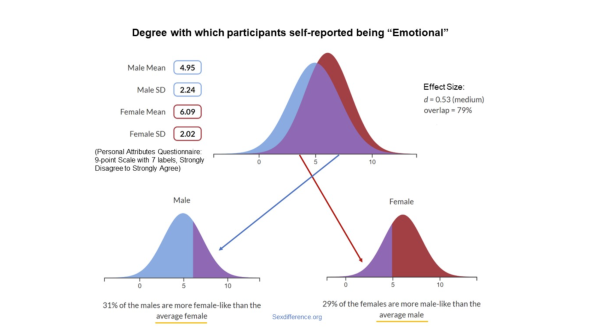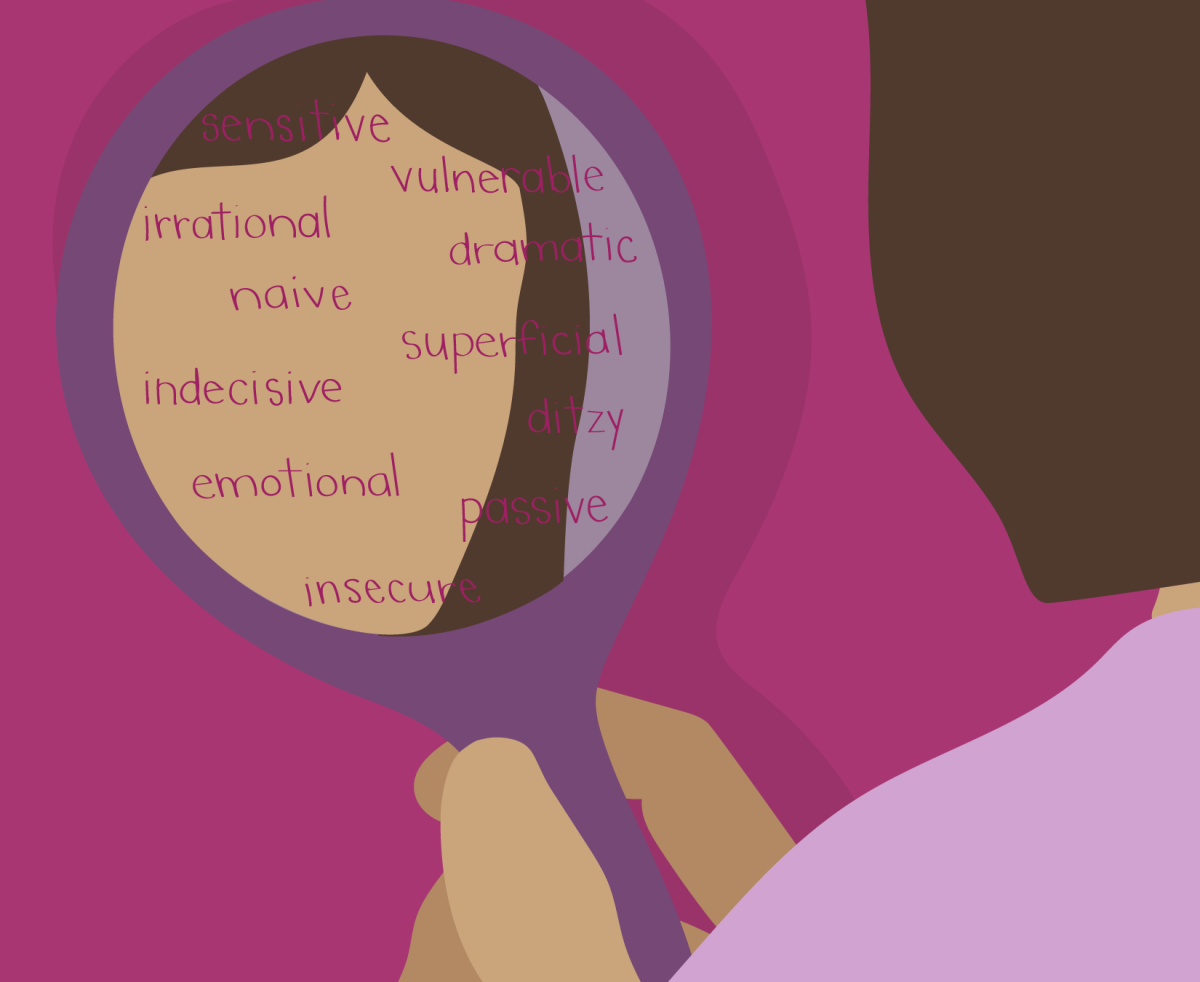Think twice before telling women they are too emotional – researchers have found the existence of this stereotype for decades.
Labeling women as “too emotional” disparages women and their expression or experience of emotions.
“If someone is in a marginalized group, if they express any sort of being upset about something like an injustice or inequality, they are almost always characterized as being overly emotional,” said Tiffany Taylor, a professor of sociology at the university.
The problem is, how people define “emotional” is subjective. Emotions range from happy to sad to angry, but when people say women are too emotional, they usually mean over-reactive, sensitive or easy to cry.
Suzanne Holt, women’s studies program coordinator and professor, said society’s gender stereotypes discredit women’s emotions.
“We have set women up to be emotional in places where that emotionality is going to come back to haunt them,” Holt said.
Science
There is no scientific evidence to support any gender differences in the way emotions are expressed or experienced, said Kathleen Casto, an assistant professor of psychology.
In a recent study, she found an 88% overlap in how emotional both male and female students feel they are.

“Men and women aren’t from two different planets – they are the same beings that have been shaped in two different ways,” Casto said. “They have different reproductive anatomy, but there’s not good scientific evidence that strongly affects anything about their cognitive and affective processes that lead to something like emotions.”
She also tested if levels of testosterone explain differences in how emotional people reported being, but found their gender expression of masculinity or femininity was a better predictor, not their biological sex.
“Their own gender identity, which is much more socialized, was a better predictor than a physiological factor like testosterone,” Casto said.
Socially constructed binaries
The socially constructed and arbitrary binaries that exist between men and women are the root of the stereotype, said Jennifer Cunningham, writing program coordinator and associate professor of English.
“Consider the emphasis society places on people assigned female at birth and how they’re socialized to believe that they should be quiet, small, modest,” Cunningham said. “These gendered norms are learned and not intrinsic or biological, although they can seem that way since this socialization begins even before we’re born.”
The binary causes people to be labeled as either emotional or rational without the ability to be both. It attaches a negative or positive connotation to those labels; emotional is bad and rational is good, Taylor said.
“Whoever is in a more privileged position is always in the sort of good side of the binary, and the people who have less privilege are seen as the bad one,” Taylor said.
The perceived differences between men and women also come from long-standing traditions.
In her book, “Paradoxes of Gender,” Judith Lorber stated gendered societal roles began in the Paleolithic period when foraging turned to hunting. With increased food supply, the number of children who had to be cared for rose, meaning tasks were split between two groups.
“A gendered division of labor in which those who took care of children, gathered and those who did not, hunted was an efficient way to produce food and children … it was a cultural solution to a technological problem that resulted in changed social organization,” Lorber wrote. “Legitimation through rituals turned many of these practices into powerful norms.”
As this was normalized, the categories became women — who took care of children – and men, who hunted.
Men’s emotions
Anger is not usually considered as an emotion because if it were, men might be just as emotional as women, if not more, Holt said.
“All you gotta do is go to a sporting event, and you’ll see men losing their minds pretty rapidly,” Holt said. “If you want to talk about rationality, you better not attend a sports game … because there will be all the proof you need to know that men are emotional.”
Social norms are more accepting of men’s expression of anger than women’s, which affects how they might handle this anger.
“We give [men] legitimized outlets for their anger, and there are very few legitimized outlets for women’s anger,” Holt said.
Susan Fisk, associate professor in the department of sociology and criminology, said there are certain emotions like anger that men can embody more than women because of expectations for women to be kind and nurturing.
“So as women, being angry or especially dominant is really highly prescribed behavior,” Fisk said. “[Society] really [doesn’t] like when women are dominant or angry.”
Gender
While there is no scientific evidence to support the stereotype that women are too emotional, there are relevant gender stereotypes that uphold it.
Gender plays a big part in emotions because they are so attached, Taylor said. It is easy to overlook the ways gender is involved in our daily lives, but ignoring it can be harmful.
“[Gender] is something that we all made up at one point, but because it’s so entangled in everything it’s hard to even imagine not having it,” Taylor said. “There’s no reason why you necessarily have to have inequality because you have gender, it just happens that that’s how we are set up.”
One of the first outward characteristics noticeable about a person is most often their gender, and it can influence expectations about their personality or competence, Fisk said.
“The problem you have with gender is it’s a piece of information that is almost always readily available when you interact with someone,” Fisk said. “When you categorize someone’s gender, that brings with it a lot of assumptions about that person, so it’s a starting point for understanding them.”
Language
One reason the stereotype persists is because it works. Saying women are too emotional elicits an emotional response, Holt said.
“I understand why people say what they say, it’s really not about the truth value of what they say, it’s about the effect that it’ll have to say that or the argument they’re trying to win by saying that,” Holt said. “They’re not trying to get 100% on a true-false quiz, what they’re trying to do is accomplish something.”
Clara Walker, senior English major, said the stereotype comes from the language people use.
“I think language has always been used against women to make them seem overactive and ridiculous when that’s not the case,” Walker said.
After being accused of containing sexist definitions, Oxford Dictionary revised some of its language.
Before revision, one of the main examples that was harmful to women was the definition of the word rabid. Oxford defined it by using the example “rabid feminist.”
“To put it as a descriptor for the word feminist, that also contributes to the whole idea that women can be overly emotional,” Walker said.
The English language creates a misconstrual of women’s words, as they are expected to speak a certain way and are spoken about differently than men.
“It’s not that women are too emotional, but that we’re socialized to interpret differently and often unfairly the ways men and women speak, even if what’s being said is the same,” Cunningham said.
Impact on women
Labeling women as emotional undermines their competence and emphasizes their gendered roles or expectations in society. The expectation is for women to be kind and “other-oriented,” and if they are not, they often face adversity, Fisk said.
“As a woman, the penalties for expressing any kind of negative emotion do feel harsher,” she said.
Fisk has experienced this gendered expectation as a professor from her students.
“Do my students think of me as a scholar or do they think of me as a teacher?” Fisk said. “It often seems like, especially as a woman, they’re really looking for a mom to mother them. They’re not looking for a brilliant teacher.”
Taylor said she has felt the same negativity regarding expressing her emotions in general.
“It has become such a negative thing to have any sort of emotion about anything, are we supposed to be robots?” Taylor said. “I can’t even imagine not being an emotional person, and it’s frustrating that it is viewed so negatively now.”
To counter this stereotype, emotions need to stop being viewed as a negative thing and there has to be space that makes emotions okay, both Fisk and Taylor said.
“We want some big, grand solution, but I think sometimes it’s just individuals changing their behavior and being allowed to, and that has a ripple effect,” Taylor said.
There is no scientific evidence to support the statement that women are too emotional and Holt said they demonstrate this every day.
“Women can bloody well put their emotions aside when they want to,” Holt said. “If you put women into a situation that requires rationality they can be rational, and they prove that every day in the roles they play.”
Savana Capp is a reporter. Contact her at [email protected].








